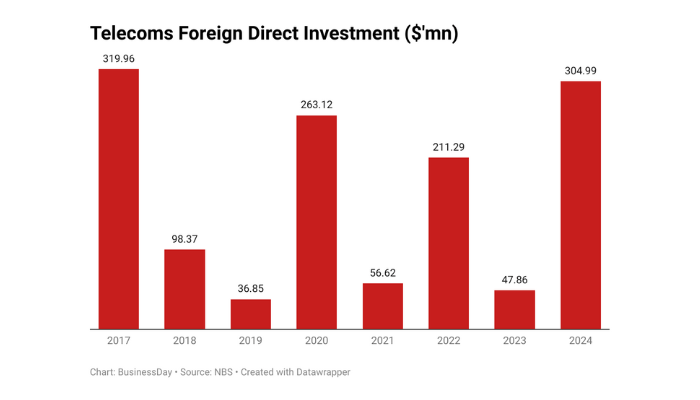
Nigeria’s telecommunications sector has recorded a significant surge in Foreign Direct Investment (FDI), reaching a seven-year high of $304.99 million in the first half of 2024. This represents a 537.26% increase from the $98.37 million recorded in H1 2018.
However, industry experts warn that this growth is insufficient to address the sector’s investment gaps or restore profitability. The National Bureau of Statistics reports that telecom investments plummeted from $319.96 million in H1 2017 to $98.37 million in H1 2018.
The sector faces new economic challenges following the Central Bank of Nigeria’s unification of the foreign exchange market in 2023. The naira’s value has depreciated significantly, from N471/$ to N1043.09/$ by December 28, 2023, and N1603.16 by October 21, 2024.
Consequently, major telecom operators, Airtel Africa and MTN Nigeria, have incurred substantial foreign exchange losses, totaling N1.29 trillion. MTN posted its first loss since listing on the Nigerian stock exchange in 2019, amounting to N137 billion, and declared a loss after tax of N519.1 billion for H1 2024.
Industry stakeholders emphasize the need for increased investment to improve service quality. Bolaji Balogun, CEO of Chapel Hill Denham, notes that telcos require $1 billion annual investments. Carl Cruz, MD/CEO of Airtel Networks Limited, warns that operating expenses are outpacing revenue growth, deterring investors.
The Association of Licensed Telecommunications Operators of Nigeria highlights the importance of foreign investments for maintaining service quality. MTNN’s CFO, Modupe Kadri, stresses that the business relies heavily on foreign exchange.
To mitigate these challenges, telcos are advocating for a tariff review to encourage investments and restore profitability.
Key Statistics:
– 537.26% increase in FDI in H1 2024
– $304.99 million FDI in H1 2024
– N1.29 trillion foreign exchange losses for Airtel Africa and MTN Nigeria
– 32.70% inflation rate